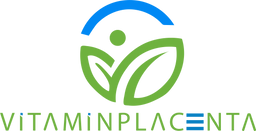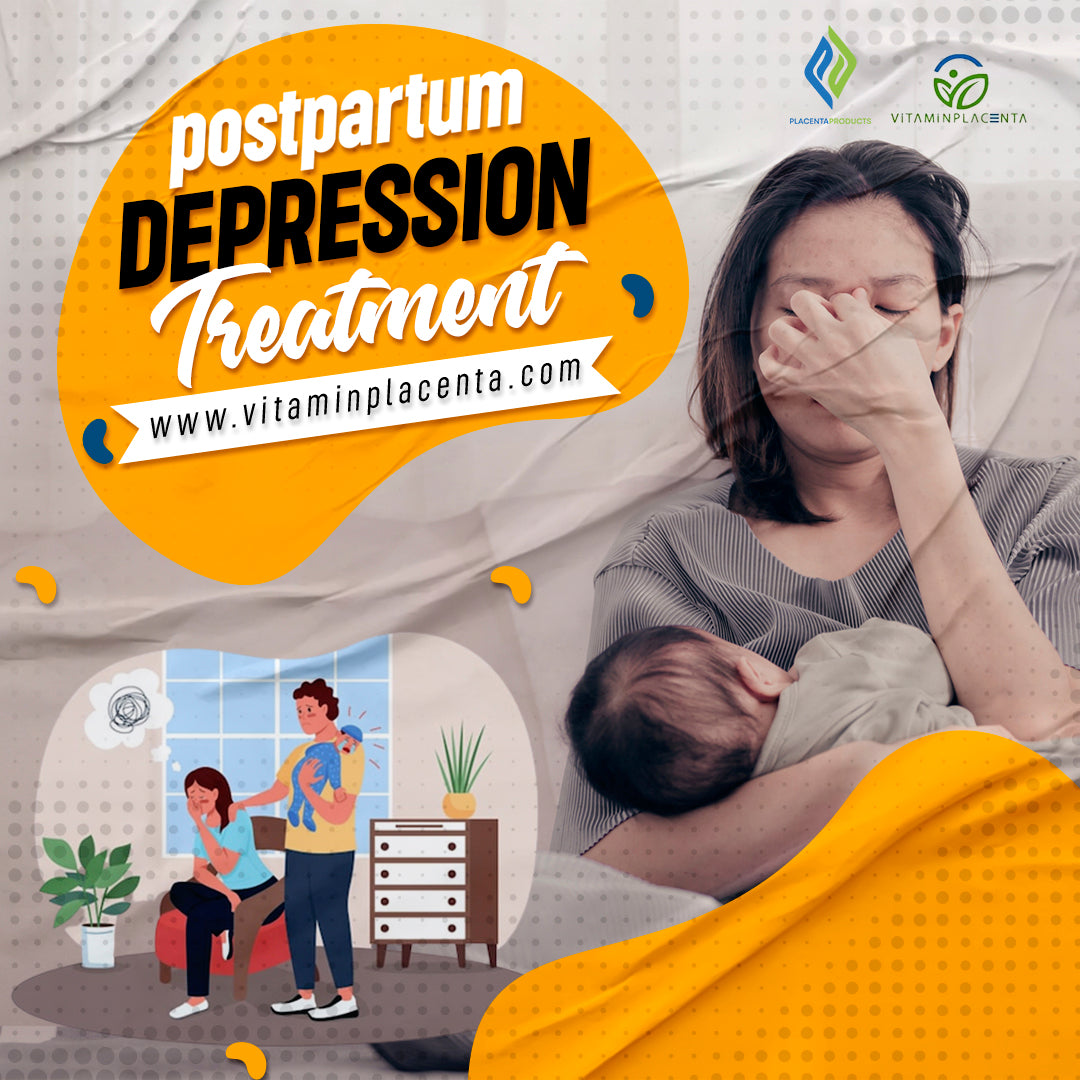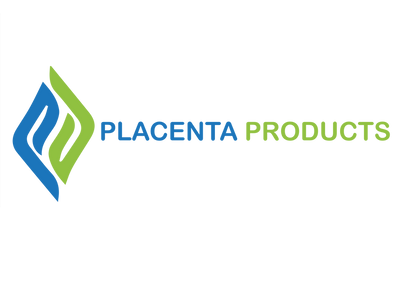Postpartum Depression Treatment
Postpartum depression is a serious diagnosis which involves complex feelings in the mother after giving birth. Here we will identify the root causes of postpartum depression, and how best to deal with it by means of traditional and alternative medication.
Help with Postpartum Depression
Anyone with a baby can find caring for them stressful and difficult, but those struggling with postpartum depression may find it considerably more difficult.
The good news is that there are things you can do on your own to reduce your symptoms and improve your adaptability to the new situation. Placenta pills benefit postpartum depression by helping the brain and body cope with stressful or painful situations after birth.

Learn more about postpartum depression symptoms, causes, and treatment options
Postpartum depression occurs when a woman experiences major depressive disorder (MDD) during pregnancy or shortly after delivery. MDD is a mood disorder characterized by persistent low energy, decreased interest in activities, and depressed mood.
Postpartum depression affects one in 10 women after childbirth. If left untreated, it can lead to serious health problems such as suicide, substance abuse, and self-harm. Fortunately, there are ways to treat postpartum depression. In fact, many women who suffer from postpartum depression find relief using complementary therapies such as acupuncture, massage therapy, yoga, and meditation.
Postpartum depression affects one in 10 women during pregnancy and after childbirth. If left untreated, it can lead to serious health problems such as suicide, substance abuse, and self-harm. Fortunately, there are ways to treat postpartum depression. Postpartum depression treatment addresses natural anxiety remedies for stress.
Postpartum depression affects approximately 10% of new mothers. Symptoms usually appear after childbirth and last from two months to one year. If left untreated, postpartum depression can lead to serious health problems such as suicidal thoughts, substance abuse, and self-harm.

Natural Treatments for Postpartum Depression
It's normal to question if natural therapies are worth a shot. Although self-treatment for PPD is possible, it is not recommended. Tell your healthcare provider about any alternative medicine you're using. Natural treatments for postpartum depression can be just as effective as any medication, or even more so.
Researchers are considering omega-3 fatty acids as a potential treatment for PPD. According to a recent study, the development of this type of depression is linked to a lack of omega-3 fatty acids in the diet. However, more evidence is needed. It appears that omega-3s are depleted from the body significantly throughout pregnancy and the postpartum period. Listed below are natural supplements for postpartum depression. Take nutritional supplements and eat more of the following:
- flax seeds
- chia seeds
- salmon
- sardines
- other oily fish
- ginger
Tea has been used as an herbal remedy for centuries. In fact, ginger was one of the first spices brought back by Christopher Columbus when he landed in America. Today, ginger tea is still popular because it helps with nausea, morning sickness, and digestive issues.
● Chamomile Tea
Chamomile tea is another effective treatment for PPD. It contains anti-inflammatory properties that can reduce pain and inflammation associated with PPD.
● Lavender Oil
Lavender oil has been used as an herbal remedy for centuries. In fact, it was one of the first oils ever discovered. Today, lavender oil is still widely used for its calming effects.
● St John's Wort
St. John’s wort is a popular herb that has been used for thousands of years to treat anxiety and depression. It contains chemicals called hyperforins, which act as antidepressants. However, there are some side effects associated with taking St. John’ s wort, such as skin rashes and photosensitivity.
● Vitamin D
A study published in the Journal of Obstetrics & Gynecology found that women who took vitamin D supplements during pregnancy were less likely to develop postpartum depression than those who did not take them.
Women who suffer from postpartum depression and do not find relief from antidepressant medication or who exhibit particularly severe or psychotic symptoms may get electroconvulsive therapy (ECT), a form of treatment typically reserved for those with treatment-refractory major depression in the general population.
In general, data on this population are scant. When ECT was used to treat refractory postpartum depression in a short research of 5 women, all reported complete recovery. The use of ECT for postpartum depression is similar to its usage for severe depression, except for concerns surrounding anesthesia and breastfeeding. Timed breastfeeding can reduce the danger of anesthetic agent transfer in breast milk because the anesthetics used in ECT are rapidly metabolized.

Treatment for Postpartum Depression
Depression after giving birth sometimes passes on its own within the first three months. But, if it causes significant distress or if "the blues" persist for more than 2 weeks, medical attention is required. It has been found that medicine or a combination of medication and psychotherapy effectively treats postpartum depression in about 90% of women who suffer from it. It's possible that joining a support group may be helpful, too.
In extreme cases of postpartum depression or psychosis, hospitalization may be required. Electroconvulsive (ECT) therapy is sometimes used to treat severe depression accompanied by hallucinations, delusions, and intense suicide attempts, but only if the symptoms are particularly severe.
Seeking help as soon as possible is recommended. It could worsen if it is identified too late or not at all. Moreover, scientists have observed that a parent's untreated PPD might impact children. It also may impact the ability for the mother to care for and bond with the infant.
From month to month, you should feel better as you work through your recovery from postpartum depression. Remember that hormone changes can cause your symptoms to increase in the days leading up to your period.

Postpartum Depression Medication
A growing body of research suggests postpartum depression can be treated as a subtype of severe depression. Metabolic changes in the postpartum period, infant exposure to medication through breast milk, the effect of depression and treatment on the depressed mother's ability to care for a new baby, and the perceived stigma of being seen as a "bad mother" for requiring medication are all unique concerns for pharmacologic treatment of Postpartum depression. Choices between pharmacologic and nonpharmacologic therapy may be influenced by these characteristics, as well as the woman's level of distress, access to care, and experience with previous treatment. Although there is a lack of evidence on the efficacy of medicine and other treatment methods for Postpartum depression, the effect size of medication suggests that it is at least as beneficial as other psychological therapies.
Some medications that are used are:
Zoloft (Sertraline)
If you've been diagnosed with postpartum depression, talk to your doctor about medication options. There's no one right treatment plan for everyone, so it's important to discuss different options with your healthcare provider.
Celexa (Citalopram)
Citalopram is an antidepressant drug used to treat major depressive disorder, obsessive compulsive disorder, panic disorder, social phobia, and generalized anxiety disorder. It works by increasing levels of serotonin in the brain.
Lexapro (Escitalopram)
Escitalopram is one of several medications available for treating postpartum depression. It has been shown to be effective in reducing symptoms of depression in women who have experienced childbirth.
Cymbalta (Duloxetine)
Duloxetine is another medication used to treat postpartum depression. Studies show that it works as well as antidepressants such as fluoxetine (Prozac), sertraline (Zoloft), and paroxetine (Paxil).
Effexor XR (Venlafaxine)
If you’re considering taking an antidepressant, talk with your doctor before starting any new medications. You should also discuss your options with your partner, family members, friends, and support groups.
There are many health benefits to consuming placenta, but it has been known for years that it can help your body look younger by affecting your skin and hair. Placental consumption helps significantly in terms of skin elasticity. It can help you look years, if not decades younger, and can also help with your and skin, secrets that celebrities have known for years. Now you too can be in the know, and get your own secret to rejuvenating your skin, re-growing while strengthening your hair, and repairing damage caused over the years.

Women who suffer from postpartum depression and do not find relief from antidepressant medication or who exhibit particularly severe or psychotic symptoms may get electroconvulsive therapy (ECT), a form of treatment typically reserved for those with treatment-refractory major depression in the general population. In general, data on this population are scant. When ECT was used to treat refractory postpartum depression in a short research of 5 women, all reported complete recovery. The use of ECT for postpartum depression is similar to its usage for severe depression, except for concerns surrounding anesthesia and breastfeeding. Timed breastfeeding can reduce the danger of anesthetic agent transfer in breast milk because the anesthetics used in ECT are rapidly metabolized.
All Pharmaceutical medications have side effects for both the mother and the baby especially if the mother is breastfeeding. The FDA approved a drug called Brexanolone to treat PPD. It is given IV for 2 days ( 60 hours) but because of the risk of side effects this medication can only be given in a clinic under the supervision of doctors and nurses. The placenta kept your baby safe in the womb for 9 months and now can help you overcome this disabling condition.

Placenta Pills for Postpartum Depression
In reality, placenta encapsulation has been used for millennia in traditional Chinese medicine, despite its recent popularity. Placenta products is a new company offering placenta pills to men and women world-wide. The product is called Vitamin Placenta and is derived from porcine placental tissue.
The term "placenta encapsulation" refers to turning the placenta into a powder and then enclosing it in capsule/pill form so that it can be taken orally after delivery. Eating placenta offers many benefits for beauty and overall health such as hormones, circadian rhythm, pain relief, reduced anxiety and much more!
The idea behind placentophagy (eating your own placenta after giving birth) is that, as a miraculous organ packed with nutrients that nourish the baby, it may also offer nutrients to the mother after birth, with iron being the most important of them. Eating placenta benefits the body, brain, and beauty. Are there real health and beauty benefits of placentophagy?
Apart from iron, the placenta is rich in other minerals and vitamins, including B6 and B12, as well as hormones like progesterone and estrogen. After giving birth, your levels of these hormones naturally decrease. Placenta benefits can be experienced in placenta capsules. Many celebrities eat placenta, including Kim Kardashian, while her sister Kourtney Kardashian called her placenta pills "Life Changing."
Many women taking these placenta pills report improved mental health, more sustained energy, less exhaustion, and greater overall breast milk production. Further, they claim that placenta encapsulation prevented them from experiencing postpartum depression. So, taking a pill made from the placenta benefits a speedier recovery after giving birth. There are many benefits of eating placenta. Placenta pills are known as beauty pills by the many celebrities eating placenta to help with postpartum depression. Placenta also helps regulate the circadian rhythm through the coritcotropin-releasing hormone (CRH), which works a natural remedy for sleep.
There are many health and beauty benefits of eating placenta. If you are uncomfortable taking your own placenta postpartum, there is good news for you. Many placenta encapsulation services offer pills made from the animal placenta, maintaining proper hygiene processes. This eliminates the risk of partaking toxic materials with the placenta, ensuring adequate health benefits. Placenta also has anti-aging benefits through production of collagen in the body. It helps promote new hair growth and treat hair loss naturally. Unlike other placenta supplements, you can feel safe knowing that Vitamin Placenta is made and produced in the USA.
Sources
- Understanding Postpartum Depression—Diagnosis and Treatment. WebMD. https://www.webmd.com/depression/postpartum-depression/understanding-postpartum-depression-treatment
- Fitelson E, Kim S, Baker AS, Leight K. Treatment of postpartum depression: clinical, psychological and pharmacological options. Int J Womens Health. 2010 Dec 30;3:1-14. doi: 10.2147/IJWH.S6938. PMID: 21339932; PMCID: PMC3039003.
- Mota-Rojas D, Orihuela A, Strappini A, Villanueva-García D, Napolitano F, Mora-Medina P, Barrios-García HB, Herrera Y, Lavalle E, Martínez-Burnes J. Consumption of Maternal Placenta in Humans and Nonhuman Mammals: Beneficial and Adverse Effects. Animals (Basel). 2020 Dec 15;10(12):2398. doi: 10.3390/ani10122398. PMID: 33333890; PMCID: PMC7765311.
- Postpartum depression. Marchofdimes.org. Published 2019. https://www.marchofdimes.org/pregnancy/postpartum-depression.aspx





